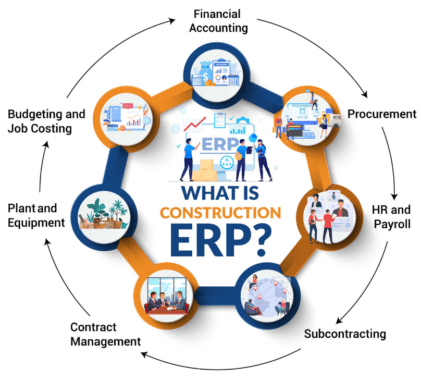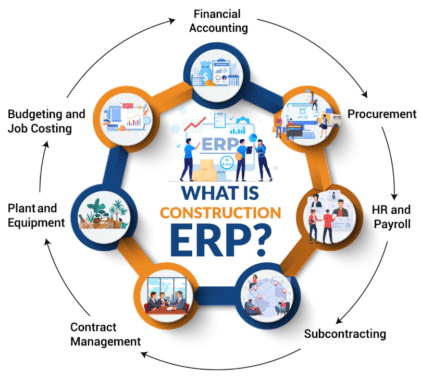Construction ERP Software: Streamlining Construction Management for the Modern Era – The construction industry is a dynamic and multifaceted field involving the coordination of various teams, complex projects, and substantial investments. Managing all aspects of their operations, from budgeting and scheduling to procurement and labor, can be challenging for many construction companies. This is where Construction ERP (Enterprise Resource Planning) software becomes invaluable. Designed specifically for the unique demands of the construction industry, Construction ERP software has emerged as a powerful tool to streamline operations, improve productivity, and ensure project success. This article will explore the critical features, benefits, and future trends of Construction ERP software in transforming how construction companies manage their businesses.

What is Construction ERP Software?
Construction ERP software is a comprehensive, integrated system designed to manage all the processes and operations in the construction industry. It combines various functions, such as project management, financial management, human resources, procurement, supply chain management, and more, into a single unified platform. Unlike generic ERP systems, Construction ERP software is tailored to meet the specific requirements of the construction sector, providing specialized features for managing multiple job sites, handling subcontractors, complying with safety regulations, and dealing with complex billing processes.
At its core, Construction ERP software offers construction companies a 360-degree view of their operations. Centralizing data and automating manual processes enables firms to operate more efficiently, make data-driven decisions, and deliver projects on time and within budget. As competition increases and profit margins tighten in the construction industry, adopting ERP software has become a strategic imperative for firms of all sizes.
Key Features of Construction ERP Software
Project Management
Construction ERP software provides robust project management tools that allow construction managers to oversee every project stage, from initial planning and scheduling to execution and completion. It helps track milestones, manage resources, allocate tasks, and monitor real-time progress. With these tools, managers can identify potential delays or cost overruns early and take corrective actions.
Financial Management
Managing finances in the construction industry is complex, with multiple projects, budgets, and payments to track. Construction ERP software offers financial management features that help construction firms manage their accounting processes, including billing, payroll, invoicing, cash flow management, and cost tracking. The system allows for detailed financial reporting and helps firms maintain project profitability by ensuring accurate budgeting and forecasting.
Procurement and Supply Chain Management
Construction ERP software simplifies procurement by automating the process, from creating purchase orders to receiving materials. It provides tools for managing suppliers, tracking deliveries, and ensuring that materials arrive on time, thus preventing costly delays. It also allows for better inventory management, ensuring that companies have the necessary materials when needed without overstocking.
Human Resource Management (HRM)
Managing labor is a critical aspect of construction projects, often involving numerous subcontractors, temporary workers, and employees spread across multiple job sites. Construction ERP software helps manage payroll, track attendance, manage labor contracts, and ensure that all workers are certified and compliant with safety standards. It also provides insights into labor costs, helping project managers allocate resources more effectively.
Document and Compliance Management
Construction projects generate massive amounts of paperwork, from contracts and blueprints to permits and safety documentation. Construction ERP software provides a centralized platform for managing all project-related documents, ensuring everyone can access the latest versions. Additionally, the software helps construction companies comply with local and international building regulations, safety standards, and environmental laws.
Analytics and Reporting
A key feature of Construction ERP software is its ability to generate detailed reports and analytics. Construction managers can access real-time data on project performance, costs, resource utilization, and other critical metrics. This data-driven approach enables better decision-making and helps firms optimize their operations for greater efficiency and profitability.
Benefits of Construction ERP Software
Improved Efficiency
One of the most significant benefits of Construction ERP software is automating various manual tasks, such as invoicing, payroll processing, and procurement. By reducing the need for manual data entry, ERP software minimizes the risk of human errors and significantly speeds up processes. This enhances operational efficiency and allows teams to focus on more strategic tasks.
Better Project Control
Construction ERP software provides managers with complete visibility into all project aspects. Whether tracking costs, managing schedules, or monitoring resource allocation, the software offers real-time insights that allow managers to control every project aspect. This level of control ensures that projects stay on schedule and within budget, reducing the likelihood of cost overruns and delays.
Enhanced Collaboration
Construction projects often involve multiple teams, from architects and engineers to contractors and suppliers. Construction ERP software fosters collaboration by providing a shared platform where all stakeholders can access up-to-date project information. This ensures that everyone is working from the same data and reduces miscommunication, often a significant cause of project delays.
Cost Management
One of the biggest challenges in the construction industry is effectively managing project costs. Construction ERP software offers tools for tracking expenses in real-time, comparing actual costs against budgets, and identifying potential cost-saving opportunities. This helps firms avoid cost overruns and ensures that projects remain profitable.
Risk Mitigation
Construction ERP software helps firms identify and mitigate risks by providing insights into potential project delays, budget overruns, and compliance issues. By giving construction managers the tools they need to spot problems early, ERP software enables proactive problem-solving, reducing the impact of unforeseen issues on project timelines and costs.
Scalability
Whether a construction company is working on small residential projects or large-scale infrastructure developments, Construction ERP software is designed to scale with the business. As companies grow and take on more projects, the software can accommodate increased data volume, additional users, and new workflows, making it a long-term solution for business growth.
Future Trends in Construction ERP Software
As the construction industry continues to evolve, so will the technology supporting it. Several emerging trends are expected to shape the future of Construction ERP software:
Cloud-Based ERP Solutions
The shift toward cloud-based ERP systems is gaining traction across various industries, and the construction sector is no exception. Cloud-based ERP software offers several advantages, including remote access to data, lower infrastructure costs, and automatic updates. This is especially valuable in construction, where managers and teams often need to access information from job sites or remote locations.
Integration with AI and Machine Learning
Artificial Intelligence (AI) and Machine Learning (ML) are poised to revolutionize Construction ERP software by providing advanced analytics, predictive insights, and automation capabilities. AI-driven ERP systems can predict potential project risks, optimize resource allocation, and provide more accurate cost estimates, helping firms make better decisions and improve project outcomes.
Mobile Access and IoT Integration
The rise of mobile technology and the Internet of Things (IoT) is driving the demand for mobile-friendly ERP solutions. Construction managers and workers can now access ERP software on their smartphones and tablets, enabling them to submit reports, track progress, and communicate with teams in real time from the field. IoT devices, such as sensors on equipment, can also feed data directly into ERP systems, providing valuable insights into equipment performance and project progress.
Sustainability and Green Construction
With increasing emphasis on sustainability, Construction ERP software is evolving to support green building practices. Future ERP systems will help firms track environmental impacts, manage sustainable materials, and ensure compliance with green building standards. This will reduce the ecological footprint of construction projects and enhance a company’s reputation in a market that increasingly values sustainability.
Conclusion
Construction ERP software is transforming the construction industry by providing the tools to manage projects more effectively, improve collaboration, and make data-driven decisions. By streamlining operations and automating manual processes, Construction ERP software helps construction companies enhance productivity, reduce costs, and ensure the timely completion of projects. As technology advances, the future of Construction ERP holds exciting possibilities, from AI-powered analytics to mobile and cloud-based solutions. For construction firms looking to stay competitive and improve their operational efficiency, adopting Construction ERP software is no longer a luxury but a necessity.

